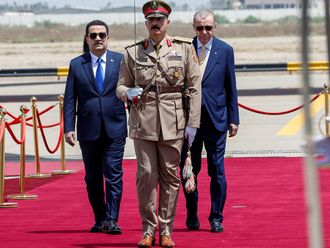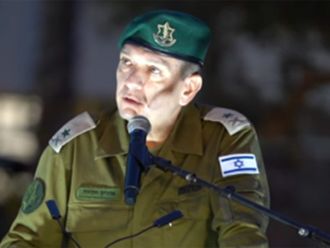Manama: Nobody has expected it to be easy or smooth.
However, more than seven months into the national dialogue launched in Bahrain to help heal deep social and political divisions that have scarred the country for more than two years, the participants have yet to agree on a basic platform and on common grounds for an agenda.
“We have repeatedly said that the dialogue has been gradually and seemingly inexorably into a long drama, like the ones we watch on television,” Ahmad Juma, the head of Al Meethaq Society and member of Al Fateh coalition of nine political societies, said. “As matters stand right now, we need to discuss the timeframe or the timeline as soon as possible,” he said.
The dialogue, started on February 10, has brought together eight delegates from a coalition of five opposition societies, eight delegates from a coalition of ten political societies, eight parliamentarians without any political affiliation and three government ministers.
The concept was that all accords and agreements throughout the talks had to be through consensus and not through voting. Organisers said that the idea was to make sure no two sides could work together.
However, Ahmad said that the consensus could hinder progress.
“We need to agree on a time frame for the talks and if we cannot agree on it, then we cannot do anything since there can be no voting. We must not believe even for fleeting minutes that the talks can go on for a very long time because that means we end up in an impasse.”
For Ahmad and his coalition, the opposition should be blamed for the delay in the talks.
“Their tactics includes boycotting sessions, pulling out and seeking to debate issues that are not related to the talks,” he said.
However, the coalition of the opposition has invariably rejected the charges and insisted that they wanted the dialogue.
“We are taking part in the dialogue because we want a solution,” Jameel Kadhem, member of Al Wefaq Society and the spokesperson for the coalition of the opposition, said. “We cannot carry on the way we are doing now if nothing changes. We need to reassess the situation,” he said.
For Jameel and his coalition, each session should be evaluated separately in order to look at the options available.
For the opposition, the main points of contention remained since the beginning the need to have a representative of the king present around the table and a fair representation at the talks.
In March, the royal court ruled out the participation of a representative of King Hamad Bin Eisa Al Khalifa at the national dialogue, saying that the monarch was for all and with all people and that he stood equidistant from all sides.
“HM the King views all participants in the dialogue as equals,” Shaikh Khalid Bin Ahmad Al Khalifa, the minister of the royal court, said. “HM the king sees them as citizens who are taking part in a patriotic act for the sake of their country. This means that no side at the dialogue represents HM the king against the other components. This is a fact that should not be disputed,” he said.
The fair representation request was strongly rejected by the parliamentarians.
“There are eight parliamentarians at the dialogue who should be replaced with eight independent figures to be selected jointly by the two political coalitions,” the opposition said.
However, the parliamentarians, four from the lower chamber and four from the upper chamber of the bicameral parliament, lashed out at the proposal.
“We represent the people and as such we have the right to have an active role in the dialogue,” MPs Lateefa Al Gaood and Sawsan Taqawi said in statements.
For Bahrainis looking at the majestic Isa Cultural Centre where the participants meet, there is no hope for white smoke coming up soon.
Inside one of its numerous marbled-floor halls, as the magnitude of the challenge becomes increasingly obvious and the chances for confidence-building measures and decisions remain dim, the participants seem to have learned how to fine-tune their negotiation skills and how to brace themselves for increasingly arduous sessions.












